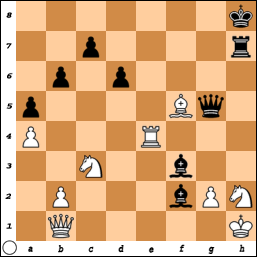There’s something about having a chess set in coffee shops that makes people want to talk. When I’m teaching a lesson to a kid, having to deal with kibitzing spectators is annoying. When I’m by myself, it’s not too bad, although it gets tiring to hear people passersby announce checkmate without looking at the position. In my most recent coffee shop chess discussion a man with a long white beard suggested that I split my students into three groups. One group would learn exclusively opening theory, the second middle game tactics and the final group would learn only endgames. Then I could have these groups play each other so that we could finally learn what the most important part of a chess game was! As I usually do when receiving a coffee shop suggestion, I agreed that this would be an interesting concept, but decided that refusing to teach 2/3 of chess to each student in the name of science might not go over well with my employers.
This conversation did remind me of a key game from my chess career. In the tournament in which I earned my NM title, I barely survived the opening against a young expert from the Midwest (Now a Master). Eventually, I reached an endgame down a pawn at which point my heavily prepped opponent played one of the strangest maneuvers I’ve ever seen from a player of that level. Within one or two moves I was able to take over the initiative. I’ll be very impressed by anyone who can predict white’s 24th and 26th moves without peeking.
Thoughts from someone who still can't quite believe that he talks about chess for a living
Sunday, January 29, 2012
Saturday, January 28, 2012
Trading Pieces
The other day at a chess club I practiced with the students how to checkmate with a queen and a rook or with two rooks. After the lesson one of the kids in the class was ahead by a queen and a rook, but was unsure what to do. I suggested that he should make fair trades to try to get into a position where he could do the queen and rook checkmate. Later on I looked at the game and noticed that one player had more pawns than he used to have and was missing a bishop. The players explained that they had simply negotiated a fair trade just as I had suggested.
As a puzzle for more experienced players than those in the story, how can white make a fair trade or better here in order to extinguish black’s initiative?

As a puzzle for more experienced players than those in the story, how can white make a fair trade or better here in order to extinguish black’s initiative?

Introduction and a Fun Game
I figure that I post on Facebook too often about chess topics, so I’m better off coming up with a place for me to vent my chess playing and teaching related thoughts here. I don’t plan on covering international chess news, as much as talking about my games, games of students and generally what I think is interesting at any given time. I’m not sure how often I’ll post new material here, but I think I’ll try to manage at least a couple times a week for the moment. I would also like to thank Bill Brock for providing a template of what a good blog looks like.
To start things off, here’s one of the more interesting of my thousands of blitz games from the internet chess club. I suggest pausing before move 16 to figure out what you would play for white.
To start things off, here’s one of the more interesting of my thousands of blitz games from the internet chess club. I suggest pausing before move 16 to figure out what you would play for white.
Subscribe to:
Posts (Atom)